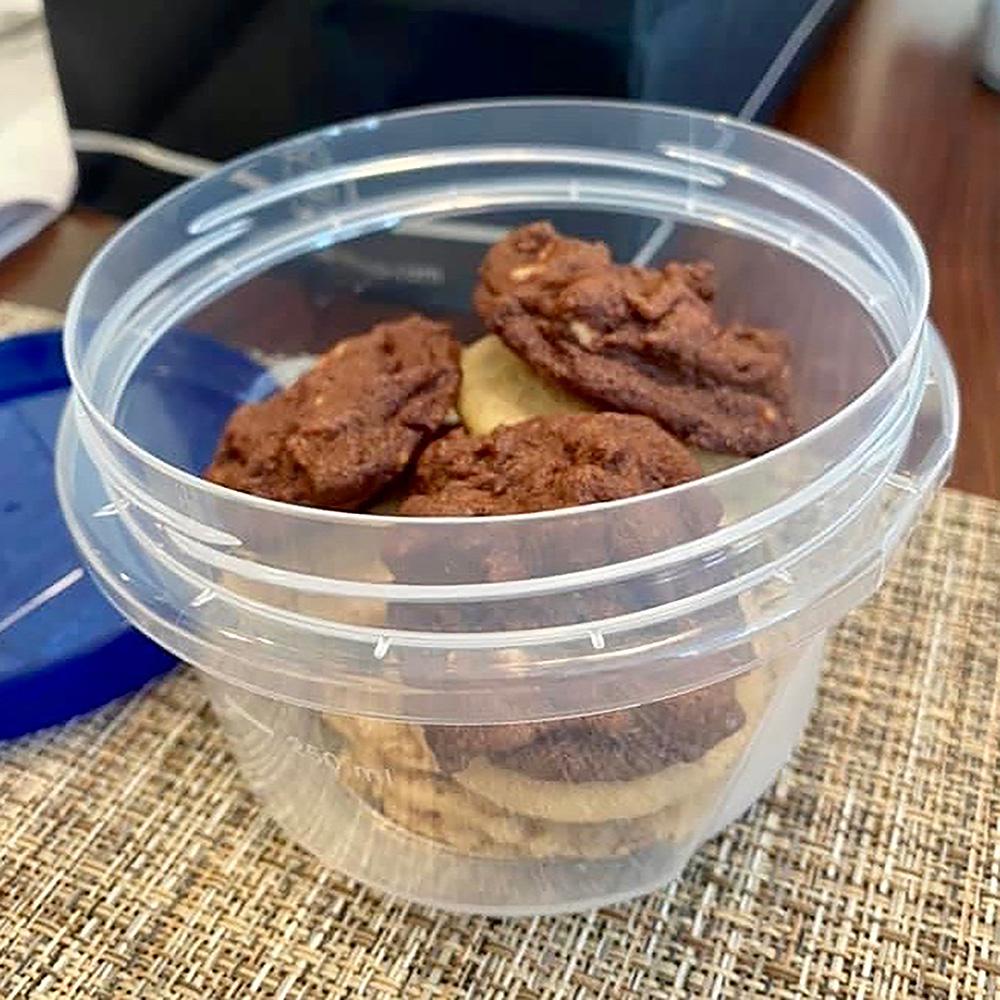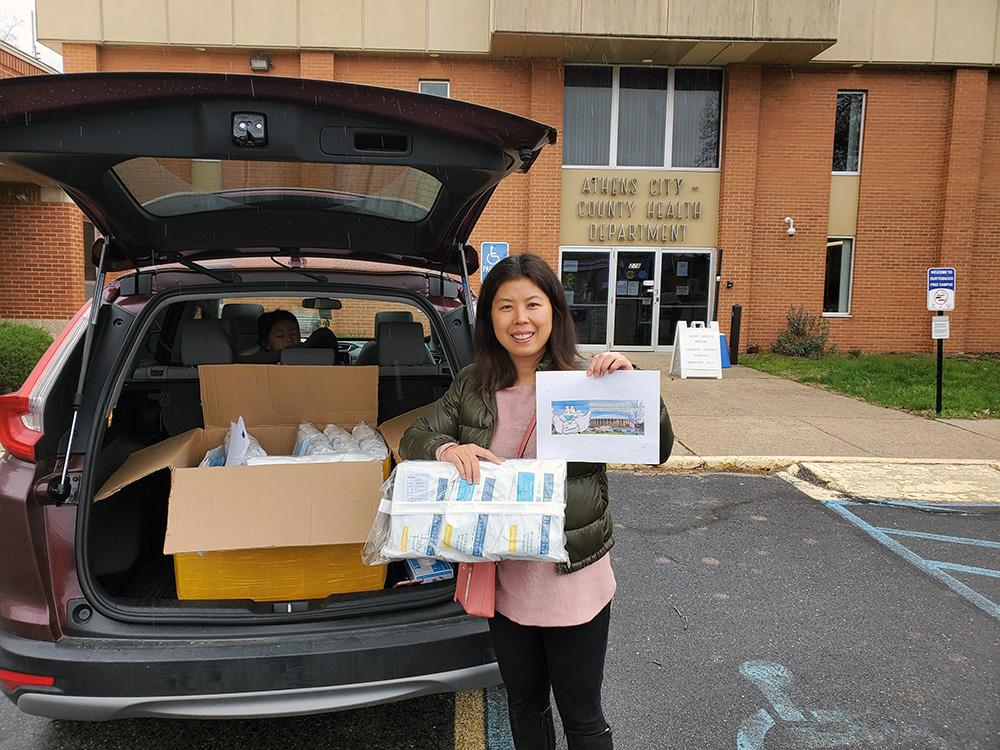

As Ohio University adjusts to its new all-virtual world, several faculty in The Patton College of Education’s Counseling and Higher Education (CHE) Department, including Drs. Peter Mather, David Nguyen, Laura Harrison, Lijing Yang, and Terrence McTier, have undertaken various initiatives to make life easier for students—and not just in the classroom.
From organizing virtual town hall meetings to preparing meals for students to donating personal protective equipment (PPE) to local healthcare workers and community members, the CHE Department is doing whatever it can to uplift others during the coronavirus pandemic.
“Faculty went above anyone’s expectations and made sure that the students in our programs were prepared not only academically, but personally, too,” said Adam Brown, a master’s student and graduate assistant in the College Student Personnel program. “I think every student in our program is thankful for their efforts.”
The Higher Education and Student Affairs (HESA) program has been quick to act throughout Ohio’s shelter-in-place order. Nguyen, who received Ohio University’s Outstanding Graduate Faculty Award in 2019, is preparing meals for students for pickup at his house. One meal included ham, mashed potatoes, and brownies.
“ These things are important to me because I want students to know that I, along with many other faculty members, are there to support them in this effort,” said Nguyen, HESA p rogram c oordinator . “ I also don't want anyone to go without any of their basic needs or supports that I know I and my family can provide if we have means to do so. Perhaps most important for students to know is that even I, a faculty member [who seemingly] has everything together, is challenged in this environment.”
Nguyen has communicated with HESA faculty throughout the pandemic, urging them to continue to meet their educational obligations and to lean on each other for guidance and support. He also asked that they continue to put their students first and do whatever they can to help them through this process.
Nguyen’s message spurred action. Harrison, for example, implemented “Cookie Wednesdays” as a means to connect with students. She bakes cookies for them each week and gives handwritten notes of encouragement.
“It seemed like something I could offer to let the students know professors are thinking of them even if we can't be with them,” said Harrison. “I’m actually on sabbatical this semester, so I don't have the students in class, but I could tell from their social media posts that they were feeling anxious and disconnected. Truthfully, I'm doing it for myself as much as for them because I miss them. When you work with young people, you can usually offer them some sort of guidance. It's frustrating to me that I can't really help them with the COVID world because it's so new to me, too. But I can at least try to let them know that I care about them.”
Harrison, who will make upwards of 1,200 cookies during the pandemic, delivers the treats to University Courtyard parking lot, where students meet from a safe distance. Flavors include salted caramel chip, peanut butter, sugar, white chocolate macadamia nut, and chocolate-Reese.
While students are staying fed, their mental health has also remained a priority. Harrison, Mather, McTier, Nguyen, and Yang have organized or hosted virtual town hall meetings on Zoom and Microsoft Teams, which allow students to debrief about coursework, share concerns related to the pandemic, and celebrate positive developments in their lives.
Each week, two different faculty members host a chat—one for master’s students and one for doctoral students—that typically draws anywhere from 10 to 30 attendees. These meetings give faculty members a chance to provide academic updates and create a sense of community within the HESA program. If students express concern about something, faculty works together to develop solutions.
Students have been extremely appreciative of these efforts and believe that they have truly made a difference in their lives.
“The faculty were not asked to provide for us or do any extra work beyond the classroom,” said Brown. “But they made sure that the students were prepared not only academically, but personally, too. Every student enjoys social-distancing in the parking lot collecting their cookies on Wednesday or gathering on Zoom to chat with our peers and professors.”
In addition, College Student Personnel students have socialized through virtual events organized by the Student Personnel Association (SPA). They have had Zoom “hangouts” and a virtual dance party.
“It is something that has become the new normal, and in all honesty, it brings a sense of comfort in these unknowing times,” said Brown. “It is by far not how we planned this year ending, but by these efforts, we can all say that we felt like we stayed in the classroom and, in a way, stayed normal.”
HESA faculty are trying to minimize the impact of COVID-19 in the community as well. On April 1, Yang and various OHIO faculty, students, and community members donated 3,460 medical and surgical masks to Athens City-County Health Department. Yang, who is from China and has extended family living there, had been following news about the coronavirus since January. Once community spread occurred in Ohio, Yang sprang into action.
“ I care about the life and health of people in the community,” she said. “ Students will not thrive in an environment that lacks health and safety. We faculty need to take actions and set examples for the students to learn and follow at a difficult time. This will lead to better human beings and a better society in the long run.”
Yang held one-on-one meetings with advisees prior to spring break to make sure they were aware of the virus and met with them after spring break to check on their well-being. She also invited multiple guest lecturers to speak about the impact of COVID-19 on higher education finance, organization, and hiring, which helped students, especially the graduating class, foresee challenges ahead and adjust their job-application strategies accordingly.
“ I think all of us will remember the time, effort, and care that the faculty in our department put into our success and our personal lives during this time,” said Brown. “Our faculty have families and children that they also have to provide for, yet that did not stop them from also providing for us. It's these types of actions and care that make students feel like they are heard and that their professors care beyond the classroom. There are no words or praises that can thank them enough for what they have done.”



